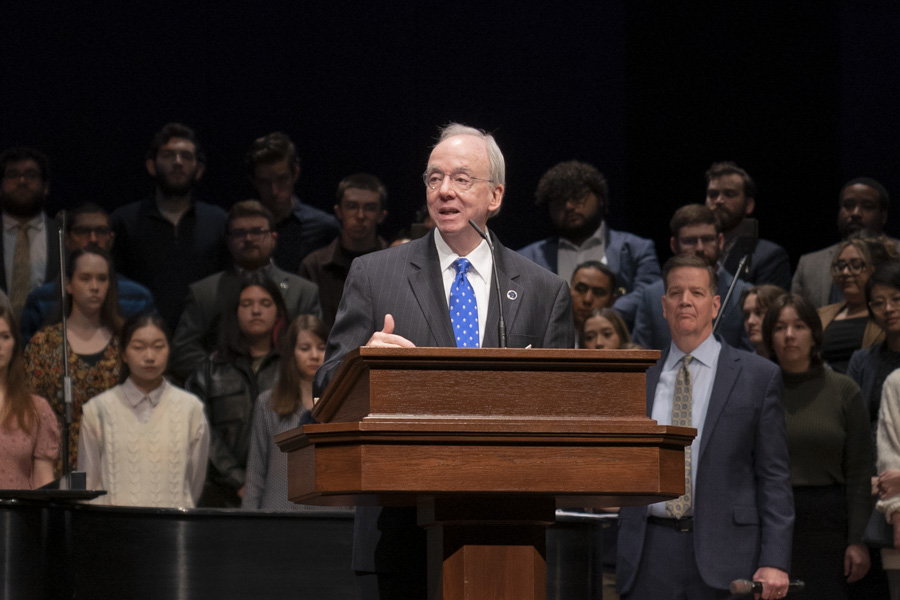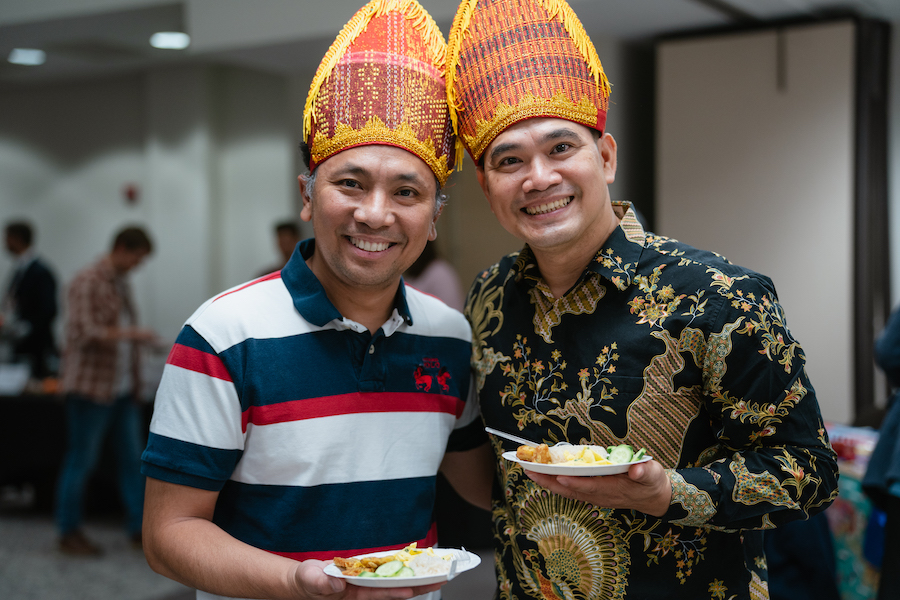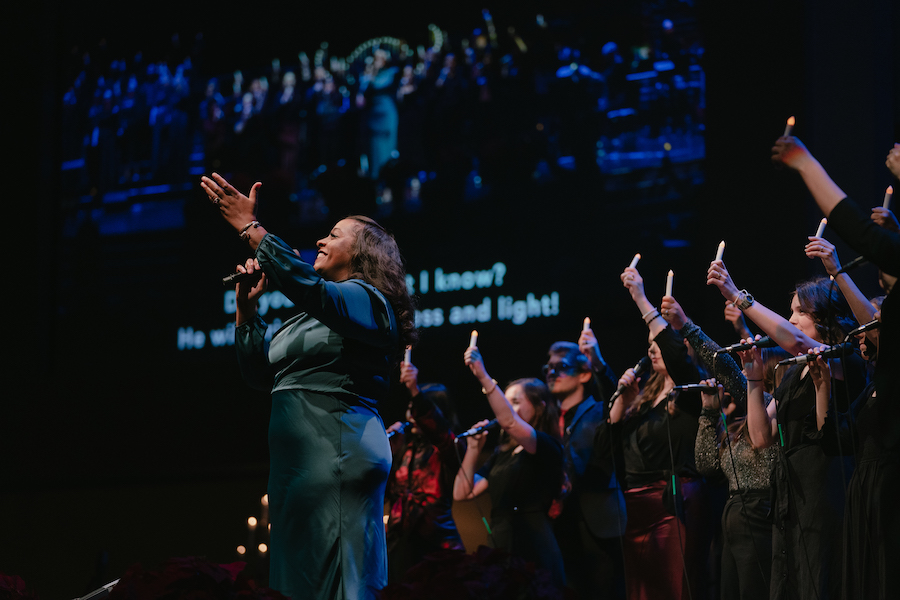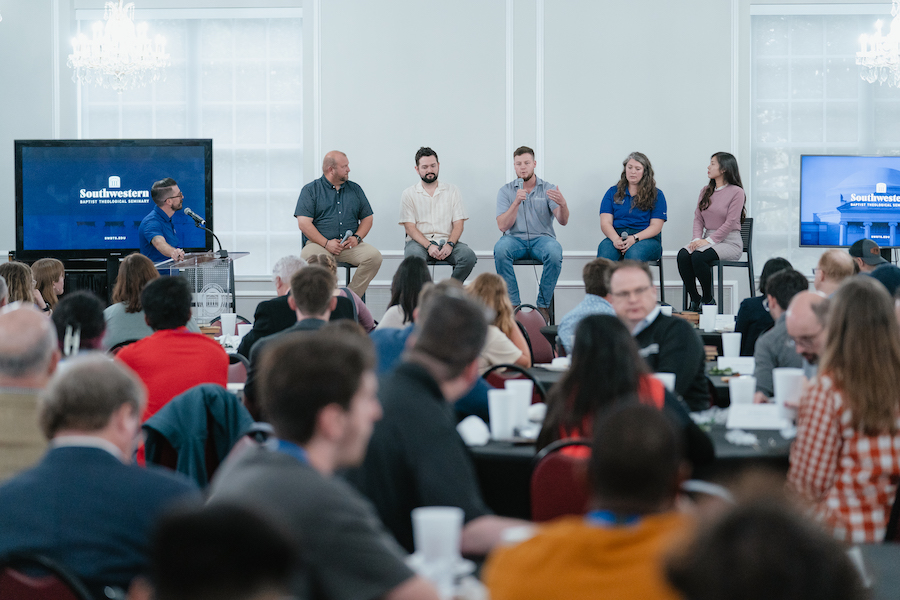Southwestern Seminary faculty affirms scripturally grounded, confessionally guided core values

During his remarks at Southwestern Baptist Theological Seminary’s Founder’s Day chapel on March 9, Interim President David S. Dockery introduced a statement of the institution’s faculty that reflects on the seminary’s core values of being scripturally grounded and confessionally guided.
Dockery said the statement “shows a reaffirmation and recommitment to two of our treasured core values.”
He noted the statement says to the Southwestern community and those “external” to the Fort Worth campus that “we are committed deeply to the inspiration, truthfulness, full authority, and sufficiency of Scripture and that like our founder, B.H. Carroll, we are biblicists, but even beyond we are confessionally guided,” referring to the seminary’s founder and first president.
The values are two of six newly stated core values that will be presented to the board of trustees at its April meeting. Dockery highlighted the first value, grace filled, during his Jan. 24 convocation address. The other values include Christ centered, student focused, and globally engaged.
Included in its entirety as part of the printed Founder’s Day program received by attendees, the statement was affirmed by the faculty of Southwestern Seminary and Texas Baptist College, the seminary’s undergraduate college.
Recalling the heritage of Southwestern Seminary as displayed through the faculty over the institution’s 115-year existence, the statement acknowledges the institution is now in a “pivotal moment” in its history and a “distinctive moment in the Southern Baptist Convention and North American Christianity.” The statement notes the centrality of the Bible at the founding of the Fort Worth institution, noting that “a commitment to the full inspiration, authority, and sufficiency of Scripture has been the hallmark of a faithful Southwestern identity.”
Recognizing “fresh challenges” in modern culture, including issues related to life, human sexuality, marriage, and inclusive language for God, among others, the statement notes these issues “point ultimately to issues of biblical authority and interpretation.”
“The Southwestern community joyfully affirms the complete truthfulness and absolute authority of God’s Word,” the statement reads while also “stress[ing] both the divine and human aspects of Holy Scripture, while affirming that the Bible, the Word of God written is inerrant and fully trustworthy.” The statement also adds, “We express our full confidence in the inspired and inerrant Scriptures as the trustworthy, reliable, and authoritative Word of God,” while also recognizing, “The Bible is to be seen as the ultimate standard of authority for God’s people.”
In highlighting the value of being confessionally guided, the statement notes, “We serve in a cultural context in which many fail to recognize there is an identifiable body of truth, and this truth is the Christian faith.” The statement recalls the history of the Baptist Faith and Message, including its original adoption at the Southern Baptist Convention meeting in 1925. L.R. Scarborough, Southwestern Seminary’s second president, led the institution’s faculty to “embrace and affirm” the statement of faith.
Noting that the faculty “envision[s] a future for Southwestern Seminary that is faithful to the best of its heritage, built upon a full-orbed doctrine of Scripture, which affirms that those beliefs and practices that rest firmly on scriptural foundations are authoritative for us as a people of the Book,” the statement acknowledges “that confession of the Bible’s truthfulness is an important safeguard, which is needed for an orthodox statement on matters of Christology, the doctrine of God, and salvation, as well as matters such as regenerate church membership, church autonomy and cooperation, as well as believer’s baptism and the Lord’s Supper.”
“In doing so, we affirm the truths expressed in the Baptist Faith and Message 2000,” the statement continues.
Noting the “scripturally grounded and confessionally guided tradition” that has been “passed” down by B.H. Carroll, Southwestern Seminary’s founder and first president, Scarborough, the late James Leo Garrett Jr., distinguished professor emeritus of theology, and others, the current faculty “gladly and joyfully commit ourselves afresh to advancing the seminary’s scripturally grounded and confessionally guided heritage and mission for the years to come,” the statement concludes.
The entire statement follows.
SOUTHWESTERNERS: SCRIPTURALLY GROUNDED AND CONFESSIONALLY GUIDED
A Statement of the Faculty of Southwestern Baptist Theological Seminary and Texas Baptist College
On this Founder’s Day, as we reflect on the 115-year history of Southwestern Baptist Theological Seminary, we recognize the importance of reaffirming our commitment to two institutional core values. We want to carry out our work of equipping students with our shared calling and commitment to be scripturally grounded and confessionally guided.
Scripturally Grounded
We now find ourselves at a pivotal moment in the seminary’s history as well as at a distinctive moment in the Southern Baptist Convention and North American Christianity. Contemporary culture is being overtaken and submerged by the expanding trends toward secularism. In this context and on this important day in the life of our institution, we are made aware that those of us who serve in the Southwestern community are beneficiaries of a blessed tradition. Because of God’s faithfulness to Southwestern, we are heirs of the nurturing truth and wisdom of B. H. Carroll, L. R. Scarborough, J. M. Price, William Reynolds, Floy Barnard, James Leo Garrett Jr., Curtis Vaughan, Roy Fish, and many others who have viewed Scripture as a special form of revelation, a unique mode of divine disclosure.
The Bible was certainly at the heart of the formation of Southwestern Seminary more than a century ago.1 In many ways, a commitment to the full inspiration, authority, and sufficiency of Scripture has been the hallmark of a faithful Southwestern identity. Without question, this commitment to Scripture has shaped the Southwestern tradition; thus, the popular description of Southwesterners as “a people of the Book.” No future can be imagined for the Southwestern community other than one built on the foundation of a commitment to a totally truthful Bible.
Scriptural authority has been challenged in particular ways since the rise of the Enlightenment. Fresh challenges, shaped by postmodern thinkers, in their postliberal and postconservative forms, now abound. Such ongoing controversies demonstrate the need for the Southwestern community to reaffirm our scripturally grounded commitments. In various denominational traditions, questions rage regarding wide-ranging issues such as life, human sexuality, marriage, “goddess” theology, inclusive language for God, pluralism, and universalism, which point ultimately to issues of biblical authority and interpretation.
The Southwestern community joyfully affirms the complete truthfulness and absolute authority of God’s Word. We confess the unity of Word and Spirit in line with the best of the Christian tradition. We want to stress both the divine and human aspects of Holy Scripture, while affirming that the Bible, the Word of God written is inerrant and fully trustworthy. While inerrancy itself is never a single issue, it does represent something far larger in scope as well as significance. The foundational issue is, and ever will be, the nature of truth, the understanding of divine revelation.
We maintain that the inspired Scriptures are normative, truthful, trustworthy, and reliable. Moreover, we affirm the Bible’s coherence and clarity, made possible by the witness of the Holy Spirit. The Bible focuses on Christ, is applicable for the church, and is affirmed to us by the testimony of the Spirit of God in our hearts. Thus, our understanding of biblical inspiration applies to all canonical Scripture, including the process, purpose, and ultimately its product.
By the concursive action of God the Scriptures are, in their entirety, both the work of the Spirit and the work of human authors. We believe the Scripture speaks not only to spiritual matters but to the truth of and about God, and to the ramifications affecting all matters related to life and godliness. We express our full confidence in the inspired and inerrant Scriptures as the trustworthy, reliable, and authoritative Word of God.
We confess that the Bible is the primary means of God’s authoritative self-disclosure for people today. The Holy Spirit has inspired the prophetic-apostolic writings, and the Scriptures have become the recognized authority to communicate God’s truth, which is to be taught, believed, and obeyed. The Bible, then, is the book of God’s truth. Because the Bible is completely truthful and trustworthy, it is our final authority in all things that pertain to life and godliness.
The Bible is to be seen as the ultimate standard of authority for God’s people. The Bible derives its authority from the self-revealing and self-authenticating God. The Spirit of God illumines our minds and hearts to understand the biblical message. Likewise, the Spirit leads us to recognize the authority of Scripture and to respond and obey its message today. A commitment to the complete truthfulness and trustworthiness of Scripture is important because it is the foundation that establishes the full extent of Scripture’s authority.
We need a renewed commitment to biblical authority that enables us to relate to one another in right doctrine but also in right practice before a watching, unbelieving world. We long for a renewed commitment to biblical authority that will transform our performance-oriented church meetings into authentic worship and praise rendering service that is pleasing to God. The Holy Spirit, through the Scriptures, illumines our appreciation of grace and motivates us toward faithful evangelism, social ministry, cultural engagement, and worldwide missions.
With willing spirits and open minds and hearts, and in faithfulness to the heritage of B. H. Carroll, L. R. Scarborough, and dozens of others through the years, we must dedicate ourselves anew to the authority of Holy Scripture, assured that we can place our complete confidence in God’s inspired, truthful, reliable, authoritative, and sufficient Word. On this Founder’s Day, we express our gratitude that the Bible was the focal point of B. H. Carroll’s life and ministry.
Carroll’s widespread reputation as a champion of Baptist orthodoxy was closely associated with his doctrine of Scripture. For Carroll, the Bible was understood to be the written revelation of God, an affirmation, which undergirded Carroll’s entire theology and interpretation of Scripture. Southwestern’s founding president emphasized that biblical inspiration ensured a perfect standard of instruction, conviction, and a profitable work for correction in righteousness.
The beginning and concluding paragraphs of Carroll’s book on Inspiration of the Bible reflects Article One of the New Hampshire Confession of Faith (forerunner to all three versions of the Baptist Faith and Message). The bottom line for Carroll was that the very words of the Bible were chosen by God.
The Southwestern theologian rejected all forms of partial or limited inspiration, saying that “when you hear the silly talk that the Bible contains the Word of God and is not the Word of God, you hear a fool’s talk.” Carroll focused on the result of inspiration which is an infallible Bible. In addition to the description infallible, Carroll also described the Bible as inerrant, true, trustworthy, irrevocable, and irrefragable. Carroll not only emphasized the full truthfulness of the Bible, but expected the Southwestern faculty to teach and serve faithfully in accordance with the confessional commitments expressed in the New Hampshire Confession.
Confessionally Guided
We celebrate and give thanks that today’s generation of Southwesterners have received the truth of the Gospel, “the faith that was delivered to the saints once for all” (Jude 3) and recognizes the need to pass on this body of truth to the next generation (Matt 28:19-20, 2 Tim 2:2). Our responsibility is to faithfully pass on what we have received from those on whose shoulders we stand.
We serve in a cultural context in which many fail to recognize that there is an identifiable body of truth, and this truth is the Christian faith. The Christian faith is not mere moralism; it is not faith in faith, some subjective amorphous feeling, or a self-help theory. The Christian faith is the manifestation of God’s truth revealed in His Son and made known to us today in his Word. What is needed today is a renewed commitment to confess, teach, and proclaim this truth across the Southwestern community, in congregations across this country, and literally around the world.
When the Baptist Faith and Message was initially adopted at the Southern Baptist Convention meeting in Memphis, Tennessee in 1925, the seminaries were asked to adopt and affirm this confessional statement. In Louisville, Southern Seminary’s influential professor of missions and world religions, W. O. Carver, expressed his displeasure with this request, viewing it as a step toward creedalism, even though E. Y. Mullins, Southern’s president, led the Baptist Faith and Message 1925 committee.
By contrast, L. R. Scarborough, Southwestern’s second president, who also served on the 1925 committee, led the Southwestern faculty to embrace and affirm the Baptist Faith and Message. The Carver tradition, which influenced large sectors of Southern Baptist life, emphasized individualistic models of what it meant to be Baptist under the umbrella of a particular understanding of the priesthood of the believer and soul competency, with the basic understanding that being Baptist means freedom.
We recognize that for many throughout the twentieth century, a false dichotomy developed between “a living faith” and “a confessional faith.” While we would never want to place any confessional statement on the same level as Scripture itself, or confuse a doctrinal statement about Jesus with a dynamic trust in Jesus, it is certainly a misunderstanding of our Baptist heritage to deny the importance of a confessional faith.
In response to this false dichotomy expressed by Carver and echoed through aspects of Baptist life throughout the twentieth century, James Leo Garrett Jr. keenly observed that the opposite of a confessional faith is not a living faith, but an unidentified faith that lacks content and depth. Thus, there is no need to construct a false choice between “a living faith” or “a confessional faith.” Instead, Garrett noted, “we need a living faith that we confess and a confessional faith that we live and proclaim. We can no more work safely in a frameless building or eat beef from a boneless cow than we can practice and communicate the Christian faith without basic affirmations of doctrinal truth.”
The 1925 confessional statement importantly affirmed that Southern Baptists believe that “the Holy Bible was written by men divinely inspired and is a perfect treasure of heavenly instruction, that it has God for its author, salvation for is end, and truth, without any mixture of error, for its matter.”
Learning From the Past, Looking to the Future
We envision a future for Southwestern Seminary that is faithful to the best of its heritage, built upon a full-orbed doctrine of Scripture, which affirms that those beliefs and practices that rest firmly on scriptural foundations are authoritative for us as people of the Book. We recognize that Scripture is thus the central legitimating source of Christian faith and theology, the clearest window through which the face of Christ may be seen. We recognize that to allow one’s ideas and values to become controlled by anything or anyone other than the self-revelation of God in Holy Scripture is to adopt an ideology rather than theology.
We acknowledge that confession of the Bible’s truthfulness is an important safeguard, which is needed for an orthodox statement on matters of Christology, the doctrine of God, and salvation, as well as matters such as regenerate church membership, church autonomy and cooperation, as well as believer’s baptism and the Lord’s Supper. In doing so, we affirm the truths expressed in the Baptist Faith and Message 2000.
A model of dynamic and confessional orthodoxy must be reclaimed in conversation with Nicaea, Chalcedon, the Reformers, the Puritans, the Pietists, and the revivalists. We do not hold out doctrinal uniformity as a goal for the Southwestern community or for Southern Baptists, but we do call for renewed commitments to the inspiration, truthfulness, authority, and sufficiency of Scripture with an accompanying commitment of a hermeneutic of faith and acceptance over against a hermeneutic of suspicion.
As an aspect of our scripturally grounded and confessionally guided commitments, we take seriously the biblical call to unity (John 17; Eph 4) in accord with the Nicene affirmation of the oneness and universality of the church, as also reflected in the Baptist confessional tradition and expressed in the Orthodox Confession (1678). We trust the Lord to grant to the Southwestern community a oneness that reflects humility, gentleness, patience, forbearance with one another in love, and a diligence to preserve the unity of the Spirit in the bond of peace (Eph 4:2-3).
Twenty-first-century Southwesterners need not only affirm the Bible’s truthfulness and the saving power of the Gospel, but we need to evidence our concern for these matters by careful biblical interpretation and theological reflection, faithful churchmanship, proclamation, repentance, and prayer. We pray for God to bring a fresh wind of His Spirit to Southern Baptist life to bring renewal to our theology, evangelism, missions, worship, education, and service. We seek afresh to relate to one another in love and humility, bringing about true fellowship and community not only in orthodoxy, but orthopraxy before a watching world.
May God grant His favor to rest on the Southwestern community and establish and bless the work of our hands (Ps 90:17), even as we pray for the Lord to bring about a renewed commitment to the Gospel, to the church, and to the truthfulness of Holy Scripture that will encourage genuine renewal for Southwestern for the days ahead.
In faithfulness to this scripturally grounded and confessionally guided tradition that has been passed to us from Carroll, Scarborough, Garrett, and others, on this Founder’s Day 2023 as we celebrate the work of God at Southwestern Seminary for 115 years, we gladly and joyfully commit ourselves afresh to advancing the seminary’s scripturally grounded and confessionally guided heritage and mission for the years to come.



